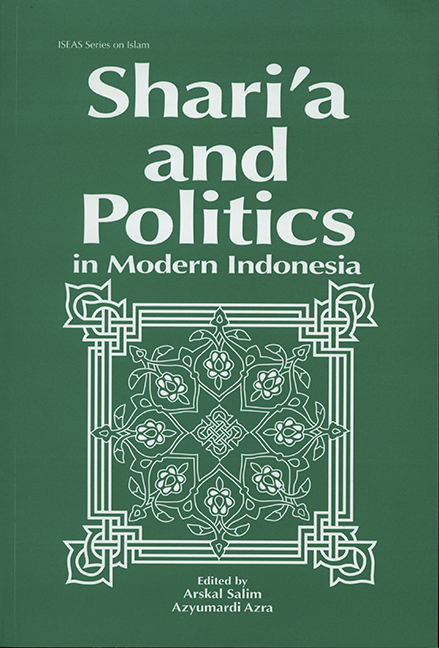Book contents
- Frontmatter
- Contents
- Acknowledgments
- List of Contributors
- Glossary
- 1 INTRODUCTION: The State and Shari'a in the Perspective of Indonesian Legal Politics
- 2 LAW AND POLITICS IN POST-INDEPENDENCE INDONESIA:A Case Study of Religious and Adat Courts
- 3 THE STATE AND SHARI'A IN INDONESIA
- 4 THE STATE'S LEGAL POLICY AND THE DEVELOPMENT OF ISLAMIC LAW IN INDONESIA'S NEW ORDER
- 5 THE INDONESIAN MARRIAGE LAW OF 1974: An Institutionalization of the Shari'a for Social Changes
- 6 INDONESIA'S 1989 RELIGIOUS JUDICATURE ACT: Islamization of Indonesia or Indonesianization of Islam?
- 7 THE POLITICAL BACKDROP OF THE ENACTMENT OF THE COMPILATION OF ISLAMIC LAWS IN INDONESIA
- 8 ISLAMIZING CAPITALISM: On the Founding of Indonesia's First Islamic Bank
- 9 FATWA AND POLITICS IN INDONESIA
- 10 ZAKAT ADMINISTRATION IN POLITICS OF INDONESIAN NEW ORDER
- 11 ISLAMIC VALUES, LAW AND EXPECTATIONS IN CONTEMPORARY INDONESIA
- 12 EPILOGUE: Shari'a in Indonesia's Current Transition: An Update
- APPENDICES
- Bibliography
- Index
11 - ISLAMIC VALUES, LAW AND EXPECTATIONS IN CONTEMPORARY INDONESIA
Published online by Cambridge University Press: 21 October 2015
- Frontmatter
- Contents
- Acknowledgments
- List of Contributors
- Glossary
- 1 INTRODUCTION: The State and Shari'a in the Perspective of Indonesian Legal Politics
- 2 LAW AND POLITICS IN POST-INDEPENDENCE INDONESIA:A Case Study of Religious and Adat Courts
- 3 THE STATE AND SHARI'A IN INDONESIA
- 4 THE STATE'S LEGAL POLICY AND THE DEVELOPMENT OF ISLAMIC LAW IN INDONESIA'S NEW ORDER
- 5 THE INDONESIAN MARRIAGE LAW OF 1974: An Institutionalization of the Shari'a for Social Changes
- 6 INDONESIA'S 1989 RELIGIOUS JUDICATURE ACT: Islamization of Indonesia or Indonesianization of Islam?
- 7 THE POLITICAL BACKDROP OF THE ENACTMENT OF THE COMPILATION OF ISLAMIC LAWS IN INDONESIA
- 8 ISLAMIZING CAPITALISM: On the Founding of Indonesia's First Islamic Bank
- 9 FATWA AND POLITICS IN INDONESIA
- 10 ZAKAT ADMINISTRATION IN POLITICS OF INDONESIAN NEW ORDER
- 11 ISLAMIC VALUES, LAW AND EXPECTATIONS IN CONTEMPORARY INDONESIA
- 12 EPILOGUE: Shari'a in Indonesia's Current Transition: An Update
- APPENDICES
- Bibliography
- Index
Summary
In the latest era of Indonesian history, from the mid-1960's to 1998, known as the New Order Era, leaders from the army, key technocrats, and agents of other nationalist-oriented groups control the Indonesian government. These leaders have not challenged the basis of the state that was inherited from the preceding Sukarno era (1945–1965); it rests on the 1945 Constitution, the philosophic slogan of the Five Principles (Pancasila), and the personality of President Suharto (b. 1921) as national guide and leader. This elite has provided political stability – welcome after a lengthy period of turmoil (1942–1966) – and it has constructed a national consensus for a policy of economic development. All other considerations are subordinate to the twin policies of political order and economic development; the place and role of Islam is no exception. (Hooker, Virginia M. 1993, 1–19; Vatikiotis 1993, 1–6, 191–205)
Prior to and throughout this era Muslims leaders, spokesmen and activists have spoken of the importance of Islamic values in the life of the Muslim community and in the operation of the Indonesian state. It is not surprising that such a call should be made, since it is a historical Muslim contention that Islamic values should be paramount wherever Muslims live; the modern call emphasizes that in Islam there is no separation between religion and state. Within this context it is possible to identify a large number of general and specific values. Most important for our purposes are syariah, the immutable and transcendent law of God, which all Muslims are enjoined to obey, and tauhid, the concept of God's unity, which is to be honored and, whenever possible, applied in belief and behavior – both private and communal. Most other values are subsidiary to these two paramount concepts and they serve as a central reference point for the Muslim community of Indonesia. (Voll 1991, 23–33; Faruqi 1980, 76–89, 264–79)
A. ISLAMIC STANDARDS AND THE GOVERNMENT
With these statements about elite concerns and Islamic values in mind, the relationship among contending and coexisting groups can be explored to ascertain an understanding of the position of Muslims and Islam in the Indonesian state and its society. One way of doing this is to compare the world views of four sets of government agencies and ministries.
- Type
- Chapter
- Information
- Shari'a and Politics in Modern Indonesia , pp. 193 - 212Publisher: ISEAS–Yusof Ishak InstitutePrint publication year: 2003



